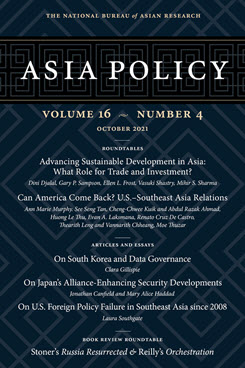Explaining the United States’ Foreign Policy Failure in Southeast Asia since 2008
This article examines the impact of changes in U.S. leadership on foreign policy decision-making in Southeast Asia since 2008, assessing the influence of systemic pressures and domestic processes in the form of elite perceptions and political constraints on foreign policy implementation.
EXECUTIVE SUMMARY
MAIN ARGUMENT
The Trump administration’s “free and open Indo-Pacific” foreign policy strategy showed notable points of departure from the Obama administration’s Asia “rebalance.” This variation is curious, considering that Washington’s interests in preserving the U.S.’s status as a Pacific power largely remained the same. This variation in foreign policy can be explained through an examination of both systemic pressures and domestic intervening variables. A permissive strategic environment increased the array of U.S. policy alternatives in Southeast Asia, allowing foreign policy choices to be more greatly influenced by leaders’ perceptions and domestic constraints. The resulting policy outcomes have left the Southeast Asian region in a state of uncertainty.
POLICY IMPLICATIONS
- Washington’s attempts to engage Beijing while challenging China’s increasing military power have fostered a permissive strategic environment in Asia. This has prevented a robust U.S. foreign policy strategy from being articulated and implemented in Southeast Asia and allowed foreign policy choices to be driven largely by domestic political constraints.
- The Biden administration faces an increasingly restrictive strategic environment in Asia, which presents an opportunity for a more robust foreign policy in Southeast Asia and the wider Asia-Pacific.
- To be successful in this, the Biden administration will need to bolster the credibility and consistency of U.S. policies toward Southeast Asia. If it does not do so, the region is at risk of falling further under China’s influence.
Laura Southgate is a Lecturer in Politics and International Relations at Aston University (United Kingdom), where she specializes in Southeast Asian regional security, Southeast Asian regionalism, and international relations theory. She is the author of ASEAN Resistance to Sovereignty Violation (2019).
About Asia Policy
Asia Policy is a peer-reviewed scholarly journal presenting policy-relevant academic research on the Asia-Pacific that draws clear and concise conclusions useful to today’s policymakers. Asia Policy is published quarterly in January, April, July, and October and accepts submissions on a rolling basis. Learn more


